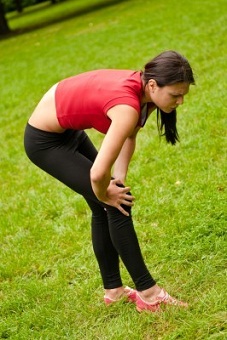Runners knee is a physical ailment that can affect a wide variety of individuals. It is also known as PFPS.
Almost 50% of athletes are going to suffer from some type of knee injury at some point and time.
When I mention athletes – I am really referring to anyone who goes to the gym or exercises on a fairly consistent basis.

Yes, this means that weekend warriors and even those sporadic power walkers may one day notice that there is some excruciating pain around and behind one of their kneecaps.
Runners are simply more likely to have problems with their knee joints due to the consistent stress and demands of their sport of choice.
Pounding the pavement, hitting those off-road running trails and even a regular workout on a treadmill at the gym can all trigger a case of runners knee.
Sports specialists and physicians have described PFPS (patellofemoral pain syndrome) as the most common of all injuries that are suffered by today’s running community.
Causes of Runners Knee
PFPS results from irritation to the femoral groove where the kneecap actually contacts the thighbone. It can be hard to differentiate the exact cause that triggers this inflammatory process but in many instances the problem is caused by:
-Overuse of the knee joints (such as repeated flexing, twisting, bending or squatting motions).
-Weakness of the Quadriceps muscles.
-Damaged or ‘worn-out’ knee cartilage.
-Misalignment of the patella.
-Over-pronated feet.
-Excessively high arches in the feet.
-Knock-knees.
-Strained or tight muscles in the calves and hamstrings.
Even the repeated stress of normal running activities can result in a person being diagnosed with PFPS.
This type of bio-mechanical health condition is more common for women and it is usually going to affect casual or recreational style runners who are under the age of 45.
The reason that women are more likely to suffer from runners knee is because of their body build which includes a wider pelvis and wider hips.
These skeletal conditions mean that the angle of the femur, in relation to the knee, is more pronounced – which creates more stress directly on the kneecap.
Symptoms to Watch For
The typical symptoms of this knee injury includes tenderness and pain both around and behind the kneecap; weakness in the knee joint and the sensation that your knee is going to collapse under your body weight.
Bending, squatting or trying to climb any type of incline will be extremely difficult and painful.
Some people find that the condition can be aggravated by simply trying to run on an uneven surface or climb a set of stairs. You may also feel a ‘popping sensation’ behind the kneecap when you are bending or stressing the joint.
Guidelines to Prevent Runners Knee
While you may not be able to keep yourself totally free from knee injuries there are some suggestions that can make you less likely to develop this muscular-skeletal condition.
-Avoid paved surfaces or rough, off-road terrain when running.
-Wear the right type of running shoes that match the needs of your feet.
-Try to run on courses such as grass or sand whenever possible.
-Build up the strength in your hamstrings, quads and calves.
-Bring hills and steep inclines into your running regimen very gradually.
-Increase your weekly mileage distance by only 5-10% at a time.
Runners Knee Exercises
Make sure that you always stretch your leg muscles before and after any type of run.
Never bend your knees past a 90 degree angle when you are performing exercises.
Hamstring stretches; calf raises and hamstring curls are all good exercises that can help you avoid problems that involve your knee.
Add weights to your leg exercises so that you can help add mass and power to these major muscle groups.
The stronger your leg muscles become the less chance you have of being bothered by knee injuries.
Return from Runners Knee to Running Tips
Return to Marathon Training Tips home
